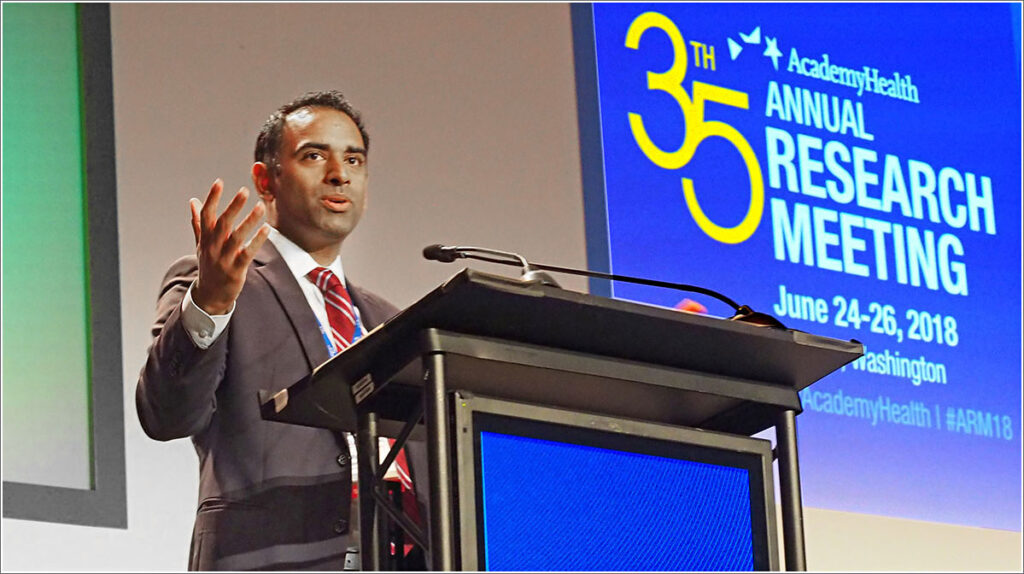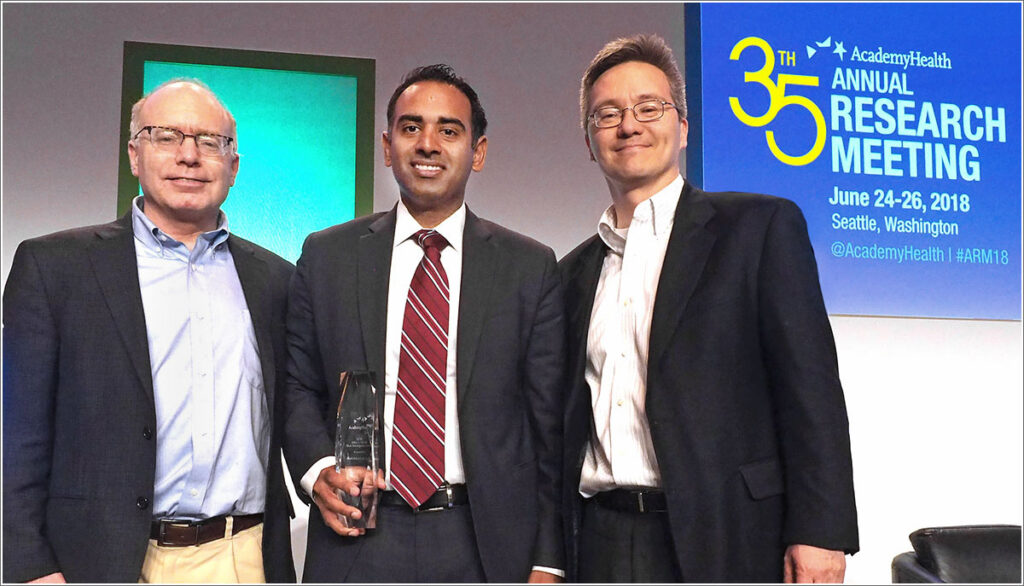News
Mitesh Patel’s Alice Hersh Award Acceptance Speech in Seattle
In Praise of the Mentors Who Altered His Career Trajectory

Photos: Hoag Levins
Mitesh Patel is the seventh Penn Medicine researcher/LDI Senior Fellow to win in the 33-year history of the AcademyHealth Alice Hersh New Investigator Award. He accepted the honor at the 2018 AcademyHealth Annual Research Meeting in Seattle. Listen his remarks:
As he began his acceptance speech as the 2018 winner of the AcademyHealth Alice S. Hersh New Investigator Award, Penn Medicine and Wharton School Assistant Professor Mitesh Patel marveled at how far he had come in 13 years. He remembered the 2005 Boston day when, as a medical student, he walked into his first AcademyHealth Annual Research Meeting (ARM), saw the massive crowd and realized “I didn’t know a single person. It was overwhelming.”
Today, Patel, MD, MBA is a Senior Fellow at Penn’s Leonard Davis Institute of Health Economics (LDI) as well as a University of Pennsylvania scientist known internationally for his studies of behavioral economics in the sphere where digital technologies and humans come together in interesting new ways that are changing the clinician-patient interface.
‘Exceptional promise’
Earlier this month, AcademyHealth announced his selection as the top “New Investigator,” a coveted honor bestowed annually to recognize young health services researchers who demonstrate “exceptional promise of future contributions” in their field. In award ceremonies on the second day of the 2018 ARM, Patel addressed the largest crowd to ever attend an Annual Research Meeting.
Much of the speech Patel gave from the stage at the Washington State Convention Center focused on the handful of mentors who impacted his career in extraordinary ways. During his time as an undergrad and med student at the University of Michigan, he developed an interest in behavioral economics but knew no one in that field. In what he described as “perhaps a bad idea in retrospect,” he emailed twenty U Mich physician researchers asking if he could get involved in one of their projects. Only a single one responded — but that was enough. Matthew Davis, MD, took Patel in and kept him working on various projects for the next five years. Davis is now Chief of Academic General Pediatrics and Primary Care at Northwestern University’s Feinberg School of Medicine.
“He helped me understand not only how to DO research but how to BE a researcher,” Patel said. “Knowing those kinds of mechanics can make the difference between just getting involved in a research project and being able to have the tools and develop the skills you need to really move a research agenda forward.”
Penn mentors
In 2007 as Patel settled in as an MBA student at the Wharton School, he applied to be a teaching assistant in an undergraduate class taught by Penn Medicine and Wharton Professor David Asch, MD, MBA. At the same time he requested and received an invitation to meet with Penn Medicine Professor Kevin Volpp, MD, MBA, to get feedback on one of his early behavioral economics study ideas. Both professors became Patel’s mentors who he credits with having an enormous impact on his career.
“Both of them had also won Alice S. Hersh Awards in the past, they were ideal role models for me and there were TWO of them,” Patel exclaimed to the delight of the audience. “It almost seemed unfair.” The three have remained colleagues, collaborators and close friends for the last ten years as they have all worked on major, pioneering behavioral economics projects.
Penn Medicine and LDI
In closing, Patel said he wanted to “thank the Penn Health System and Penn Medicine without whose partnerships we wouldn’t have been able to launch and do the work that has been so meaningful. This includes Kevin Mahoney, Roy Rosin, Ralph Muller and Larry Jameson. I also went to thank the Leonard Davis Institute of Health Economics which is really the glue for bringing researchers on campus together and the network through which we can spread our research far and beyond.”
In an interview afterward, Patel emphasized how dramatically the trajectory of his career has been changed by the selfless input and guidance he has received from his mentors and how much he has come to realize the importance of doing the same for his own mentees.
“Mentoring,” he said, “is so the key in this process of producing researchers who have the potential to really make a difference with their work. The role that mentorship played in my path toward receiving the Alice Hersh Award has also helped me realize the future role that I can play in mentoring trainees and junior faculty. I am hopeful that I can have the same impact on young investigators as my mentors had on me.”
Alice Hersh Award origins
The award is named in honor of Alice Hersh, who in 1982 became the founding executive director of the Association for Health Services Research, the organization that later changed its name to AcademyHealth. In a memorial written after her death in 1997, HSR journal editor Stephen Shortell, PhD, wrote that in Hersh’s 15 pioneering years at the AHSR helm, she “took the organization from ground zero and built it into the most respected and visible association representing health services and policy research in the world.”
As part of her relentless campaign to expand the presence and influence of HSR scientists Hersh was especially interested in nuturing the discipline’s most promising new researchers. Toward that end in 1986, she conceived and launched the annual AHSR New Investigator Award that was posthumously renamed in her honor.
In the 33 year history of the AcademyHealth New Investigator Awards, University of Pennsylvania faculty members who have been both Penn Medicine researchers and LDI Senior Fellows have won seven times — or 21% of all New Investigator awards. This is second only to Harvard researchers who have won “New Investigator” nine times — or 27% of all the awards.
Penn’s Alice Hersh New Investigator winners to date are:
2018
Mitesh Patel, MD, MBA, MS, now Assistant Professor of both Medicine at Penn’s Perelman School and Health Care Management at the Wharton School, LDI Senior Fellow, Director of the Penn Medicine Nudge Unit and faculty member of Penn Medicine Center for Health Care Innovation.
2011
Scott Halpern, MD, PhD, MSCE, now Professor of Medicine at Penn’s Perelman School, LDI Senior Fellow, Deputy Director of the Center for Health Incentives and Behavioral Economics (CHIBE), and Director of the PAIR Center, an end-of-life decision science center.
2009
Rachel Werner, MD, PhD, now Professor of Medicine at Penn’s Perelman School of Medicine, LDI Senior Fellow, Director of Health Policy and Outcomes Research in Penn’s Department of Medicine, and Associate Chief for Research in the Division of General Internal Medicine.
2007
Kevin Volpp, MD, PhD, now Professor of Medical Ethics and Health Policy in the Perelman School, Director of the Center for Health Incentives and Behavioral Economics (CHIBE) and Professor of Health Care Management in the Wharton School.
2005
Katrina Armstrong, MD, MSCE, now Chair and Physician-in-Chief of the Department of Medicine of Massachusetts General Hospital, former Director of Research at LDI, Chief of the Penn Medicine Division of General Internal Medicine, and Associate Director of the Abramson Cancer Center.
1997
David Asch, MD, MBA, now Professor of both Medicine and Medical Ethics and Health Policy at Penn Medicine and Health Care Management at the Wharton School, LDI Senior Fellow, Executive Director of the Penn Medicine Center for Health Care Innovation, and former Executive Director of LDI.
1993
Alan Hillman, MD. MBA, deceased. Former Professor of both Medicine at Penn’s Medical School and Health Care Systems at the Wharton School, LDI Senior Fellow and Director for Health Policy.

Three Penn Alice Hersh Award winners on stage in Seattle: David Asch, MD, MBA (1997), Mitesh Patel, MD, MBA (2018), and Kevin Volpp, MD, PhD (2007). Asch is the Executive Director of the Penn Medicine Center for Health Care Innovation, Patel is the Executive Director of the Penn Medicine Nudge Unit, and Volpp is the Executive Director of the Center for Health Incentives and Behavioral Economics. The three have been collaborators for the last ten years.